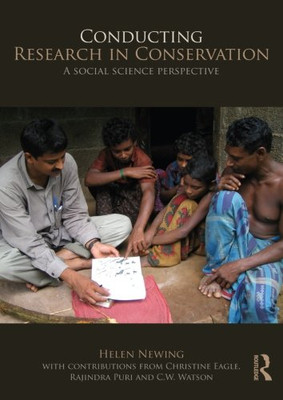
Conducting Research In Conservation
Routledge
ISBN13:
9780415457927
$79.24
Social research is vital for effective conservation. Here at last is an authoritative, clear and practical guide to conducting successful social research in conservation. The authors effectively blend state-of-the-art thinking in social research with practical examples from conservation projects around the world. A must-have book for conservation researchers and practitioners. Dr Paul Jepson, School of Geography and Environment, University of Oxford. "Conducting Research in Conservation makes a much needed contribution to the field. Well written and highly accessible, this introduction to conservation-relevant social science methods will serve as a valuable resource for novices and experts alike. In particular, its practical guidance will help conservation professionals to navigate the navigate the complexities of social science research in the `real world'" Dr Michael B. Mascia, World Wildlife Fund, USA. Conducting Research in Conservation is the first textbook on social science research methods written specifically for use in the expanding and increasingly multidisciplinary field of environmental conservation. It is a comprehensive and accessible guide to social science research methods for students of conservation-related subjects and practitioners trained in the natural sciences. Boxes provide definitions of key terms, practical tips, and brief narratives from students and practitioners describing the practical issues that they have faced in the field. The first section on planning a research project includes chapters on the need for social science research in conservation, defining a research topic, methodology and sampling. Section II provides an in-depth focus on a range of social science methods including standard qualitative and quantitative methods such as participant observation, interviewing and questionnaries, and more advanced methods, such as ethnobiological methods for documenting local environmental knowledge and change, and participatory methods such as the `PRA' toolbox. Section III focuses on practical issues in carrying out fieldwork with local communities, from fieldwork preparation and data collection to the relationships between the researcher and the study community. Section IV then demonstrates how to analyze social science data qualitatively and quantitatively; and the final section outlines the writing-up process and what should happen after the end of the formal research project.
- | Author: Helen Newing
- | Publisher: Routledge
- | Publication Date: November 01, 2010
- | Number of Pages: 400 pages
- | Language: English
- | Binding: Paperback
- | ISBN-10: 0415457920
- | ISBN-13: 9780415457927
- Author:
- Helen Newing
- Publisher:
- Routledge
- Publication Date:
- November 01, 2010
- Number of pages:
- 400 pages
- Language:
- English
- Binding:
- Paperback
- ISBN-10:
- 0415457920
- ISBN-13:
- 9780415457927





